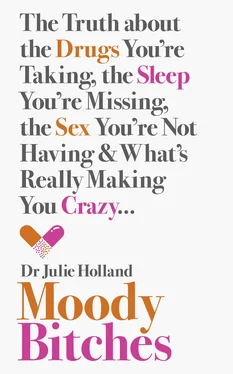Whether it’s food, alcohol, drugs, cell phones, or shopping, we all rely on something in order to numb ourselves during difficult times. Whatever the chosen substance, it offers a welcome promise: that things will be different and better once it is consumed. But you can never get enough of something that almost works, and because our solutions are usually synthetic, not natural, we come up short. We are uncomfortable in our own skin, with our own desires; we are not at ease in our homes and offices, in our roles as parents or caretakers of our parents. Plowing forward, we think we can outrun the angst if we just stay “insanely busy.”
In my psychiatric practice, my patients, like most women, are starved for information about the drugs they’re taking and how they can change how they’re feeling. Moody Bitches is an answer to both problems. I name names (which medicines I love, and the ones I avoid) and discuss the real side effects I’ve observed—weight gain, libido loss, becoming blasé—and what you can do about them. I share straight talk about enhancing your sex life, the direct link between food and mood, sticking to exercise or sleep schedules, and perhaps the most important piece: tuning in to your body to realign with your natural, primal self.
When I started my practice twenty years ago, women came to me confused by their symptoms and unsure of what to do. They complained of difficulty getting back to sleep or agitation or tearfulness, but they didn’t quite know what was wrong. I helped them put a name to their symptoms and explained that there were medicines that could help. I needed to do more teaching about drug therapy back then, and a lot more hand-holding. I would set aside the last ten or fifteen minutes of the hour-long initial consultation in order to quell the fears of people who were wary of taking something that would alter their brain chemistry.
These days, new patients come to me sure that they need medicine for their nerves or their moods, like most of the other women they know. They want me only to help them figure out which one. The confusion used to be: “I can’t understand why I keep waking up at four in the morning”; “It’s so hard to get out of bed and I don’t really care about anything”; “I’m angry all the time, and I don’t know why.” But over the years, the conversation has morphed, so that now it usually begins with something like this: “Can you tell me the difference between bupropion and venlafaxine?”; “I can’t figure out if I have ADD or OCD”; “Do you know that ad with the woman riding the horse on the beach?”; “Is that new butterfly sleeping pill better than zolpidem?” And the one I hear more than you can imagine from my established patients: “Is there anything new I can try?”
The drug companies started direct-to-consumer advertising in the 1980s. Soon after I started my private practice in the mid-1990s, it became less heavily regulated. Ads started springing up on television and in magazines, trumpeting the latest antidepressants and sleeping pills. I went along for the ride as America’s use of all prescription psychiatric medications tripled during the nineties, as a direct result of this powerful marketing. By 2006 the antidepressant Zoloft (sertraline) had made more money than Tide detergent, and it became clear to me that something new was happening. Drug companies are spending billions of dollars to turn normal human experiences like fear or sadness into medical diseases. They aren’t developing cures; they’re creating customers. The problem is not our emotionality; the problem is that we are being persuaded to medicate it away.
The latest news is particularly terrifying. Aripiprazole, a medicine originally formulated to treat people with schizophrenia, expanded into the depression market and is now our nation’s top-selling medication, and not just of psych meds. America’s number one moneymaking medicine is an antipsychotic. As a psychiatrist, I must tell you, this is insane. There is an ancient Greek word, pharmakon , which held disparate meanings—sacrament, medicine, and poison. It is a common saying in medicine that sometimes the treatment is worse than the disease. There are many medications (chemotherapy is a good example) that are helpful or curative at lower doses but dangerously toxic in higher amounts. It is also true that there are powerful medicines that are appropriately used for one diagnosis but are complete overkill for another. Prescribing antipsychotics to treat depression seems particularly out of balance, especially given the risks of irreversible side effects like diabetes or movement disorders inherent in this class of medicine.
We represent 5 percent of the global population, yet we take 50 percent of the world’s pills. (We also take 80 percent of the world’s painkillers.) Meanwhile, the percentage of people labeled with psychiatric diagnoses is continually growing. Is it possible there really is an epidemic of mental illness and disability happening in our lifetime, or are physicians too quick to reach for their prescription pads instead of offering harder solutions to their patients’ complaints? Medical journals are full of only one kind of ad: pages of information on the newest drugs and exactly how to prescribe them. Four out of five prescriptions for antidepressants are not even written by psychiatrists but rather by general practitioners, and more often than not they’re prescribed for patients without an actual diagnosis of depression. Particularly troubling: surveys of primary care doctors show they routinely overestimate what the antidepressants can do. They’ve been hoodwinked by the ads, like the rest of America.
Just as offering your toddler the choice between the red dress and the blue dress moves the conversation forward, beyond “you need to wear a dress,” the barrage of antidepressant advertising advances the question from Should I take an antidepressant ? to Which one should I take ? Don’t let pharma-con change the way you manage your moodiness. I’m here to tell you that there are healthier ways to treat depression, anxiety, and irritability that don’t include pills.
It is not solely the right cocktail of neurotransmitters that dictates mood; more than anything, it is how we live our lives. We can improve how we feel by changing behaviors around food, sex, exercise, addictions, and work/family balance. The problem with taking your happy pills and puttering along as before is that it’s no better than sweeping dirt under the carpet. I want you to take that rug out back and beat the hell out of it.
But this is not drudgery. It begins with awareness, with the natural process of reconnecting with yourself and your body. Understanding the meaning and utility of your moods is empowering. Reclaiming your authentic, natural self is liberating. It is wholesome and it is healing. Not just for you, but also for your partner, your family, and your community.
This book begins with information about our complex inner workings, revealing the science behind why, as caregivers and nurturers, women have evolved to think and feel differently from men. I explain the wisdom of feeling deeply, and the dangers of cutting ourselves off from that depth. I look closely at why the twenty-eight-day cycle brings on tears and insatiable hunger (and what you can do about it), and how oral contraceptives and antidepressants can disrupt natural phases of desire and connection, potentially leading you to choose “Mr. Wrong,” or even to opt out of any mate choice entirely.
The second section delves into relationships and family, with a particular focus on how women’s moods mirror critical transition points in our lives. From menarche (the very first menstrual cycle) to mating, from motherhood to menopause, our ever-fluctuating hormones not only dictate but also respond to our behaviors. Testosterone may make you horny to go out and find a guy, but, more likely, seeing a hot new guy will make your testosterone levels rise. We tend to think of love and sex as distinct, but falling head over heels is a physical experience as powerful as any mind-altering drug, and orgasmic sex can trigger hormones that change how attached you are to your partner, complicating your casual hookups. The early stages of a relationship are difficult enough to navigate, but long-term commitment poses its own complications. Moody Bitches tells the truth about monogamy and desire, and why it is that your SSRI (anti-depressants like paroxetine or sertraline) is likely not doing you any favors in the bedroom. I also explain the physical and emotional consequences of pregnancy and child rearing; becoming a mother changes not just your body but your brain.
Читать дальше












